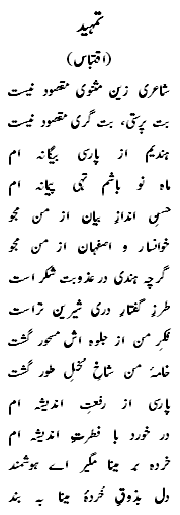
Search the Republic of Rumi
|
Chapter 6
The Poet
Rustam was a legendary hero of ancient Persia. Ali, the cousin of Prophet Muhammad (peace be upon him), the fourth caliph who is also acclaimed as a founder by most schools of Sufism, was called “the Lion of God.” How can Rustam be related to Ali is a question you confront soon after entering the Garden of Poetry.
It is daybreak when you enter the first enclave, Secrets and Mysteries. It consists of two parts and the first is called ‘The Secrets of the Self’. Maulana Jalaluddin Rumi greets you at the entrance, rather like a dean welcoming a fresh student. His welcome note is short:
Yesterday the Shaykh wandered about the city with a lamp:
“I am weary of demon and monster: I seek a human being.
I am sick of feeble-spirited companions,
I seek the Lion of God or Rustam of the legends.”
I said, “What we have sought is never found.”
He said, “I seek that which is never found.”
The apparent calm and simplicity of this riddle is awe-inspiring. You have received a heavy blessing.
Prelude
As you enter the Prelude, you are greeted by another Persian poet, Naziri of Nishapur:
Nothing in my forest has gone waste:
Wood that could not be used in the pulpit has been made into gallows.
The gallows refer to Mansur Hallaj, a ninth century Sufi who was executed for saying “Ana al Haque,” which could mean “I am the Creative Truth,” “The self is God” or “I’m God.”
In the Garden you can see flowers that are not yet born. Deer that have not yet sprung from non-existence leap in front of you. In a flashback, you see Iqbal as an unfinished statue. Rumi chisels him with love and says, “How long will you be silent like a bud? O marching bell of the caravan, awake!”
Iqbal becomes a giant wave of the boundless and mysterious ocean that is Rumi. The wave lodges itself in the heart of the ocean and becomes a pearl. Then the ocean appears to be shrinking until it becomes a tiny flower in the garden that is the Muslim nation.
“I have no need of the ear of today,” Iqbal informs you. “I am the voice of the poet of tomorrow. My own age does not know the secrets. My Joseph is not for this market. No one has told the secret which I will tell. Come, if you would like to know the secret of everlasting life. Come, if you would like to win both earth and heaven.”
| DISCUSS |
|
 |
You have reached the end of this chapter. You may like to discuss it before reading the next. |

Search the Republic of Rumi
|
The reader learns that all previous knowledge and learning must be held in abeyance while in the Garden.


 Special
thanks to
Special
thanks to